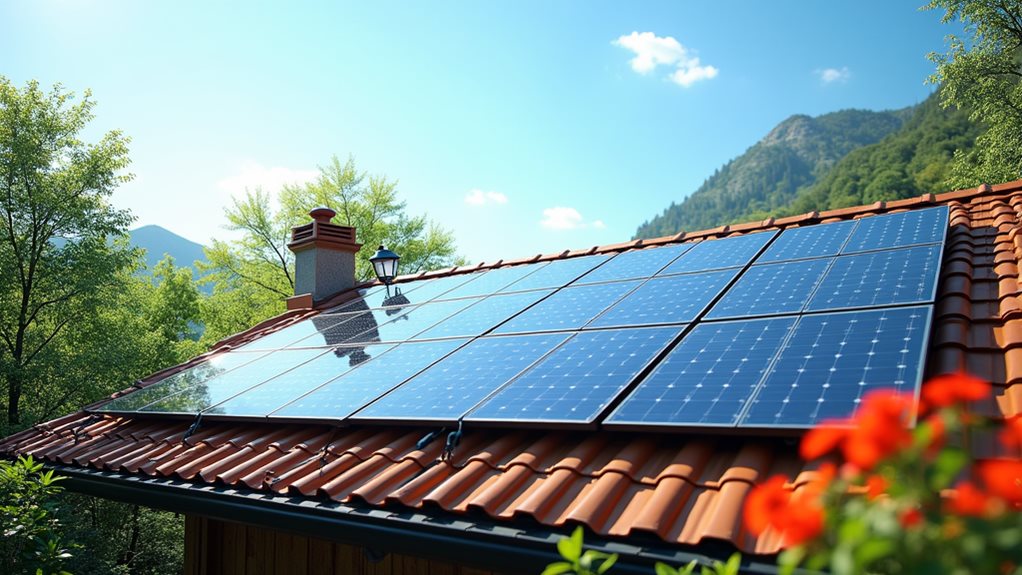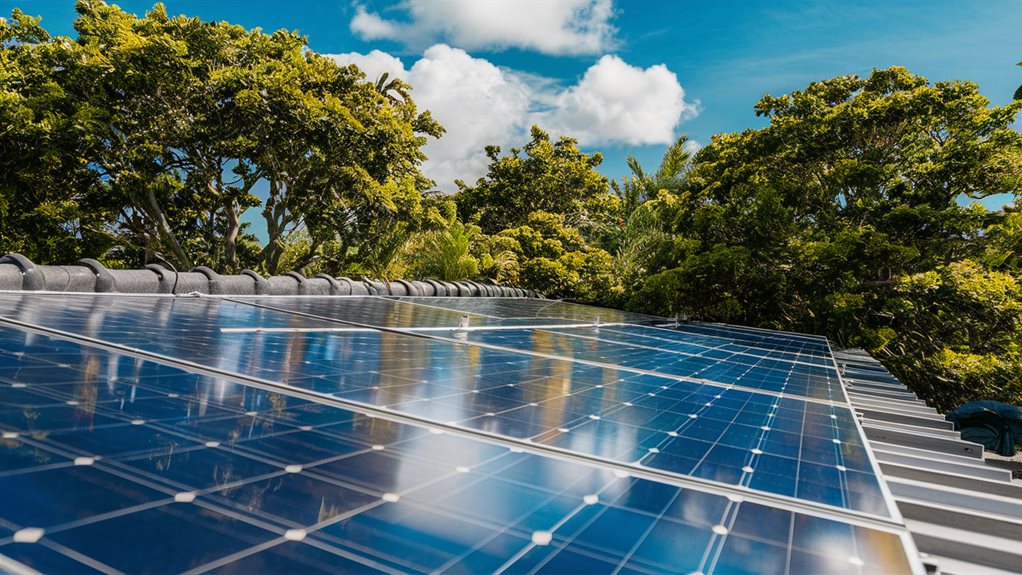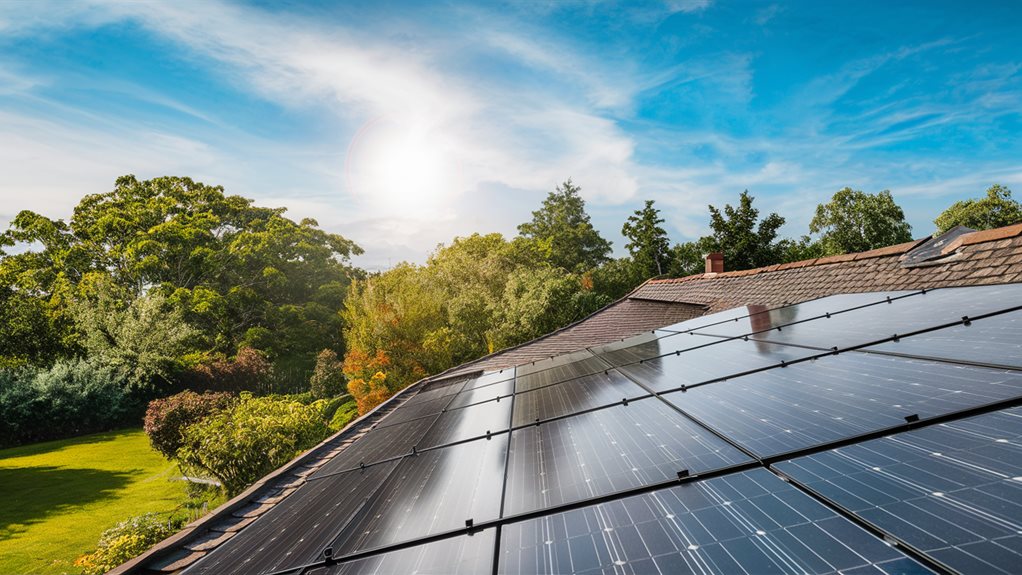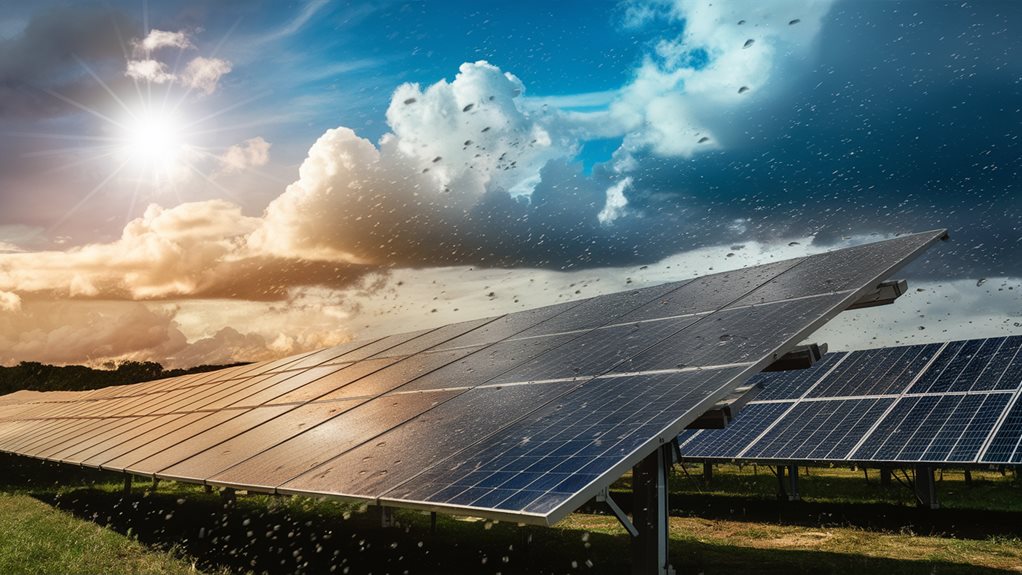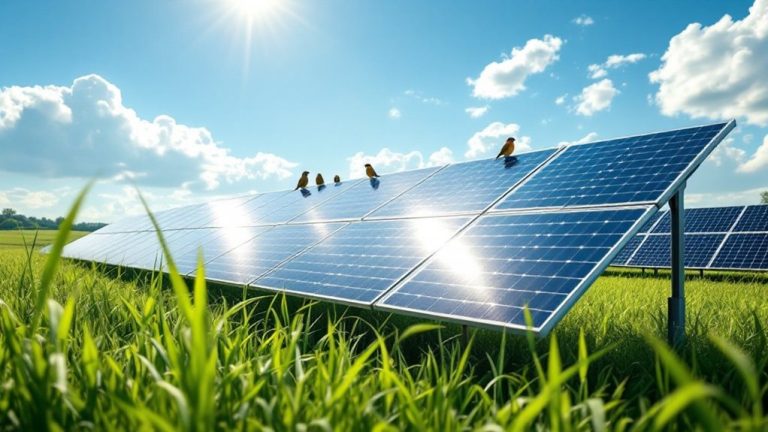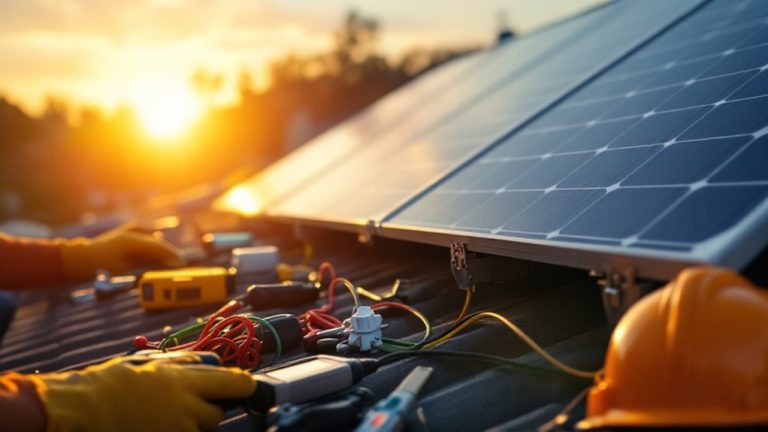As the demand for sustainable and economically viable energy solutions rises, solar panel installation emerges as a significant consideration for homeowners and businesses alike. The shift to solar power not only offers the promise of lower electricity bills and energy independence but also aligns with global efforts to reduce carbon footprints and foster environmental stewardship. In addition, the financial implications extend beyond cost savings to include potential property value enhancements. However, the true extent of these benefits and their long-term sustainability remains a point of intrigue, especially when considering variables such as weather patterns and technological advancements.
Expert Highlights
- Solar panels significantly reduce electricity bills, offering immediate and long-term financial savings.
- They contribute to environmental sustainability by reducing greenhouse gas emissions and air pollution.
- Installing solar panels can increase property value, attracting eco-conscious buyers and ensuring faster sales.
- Solar panels offer a positive return on investment, with payback periods typically ranging from 6 to 10 years.
- Seasonal changes and weather conditions impact solar panel efficiency, with low temperatures and snow reflection enhancing performance.
Solar Panel Installation Explained
When considering solar panel installation, a clear understanding of the steps involved, from site assessment to final connection, guarantees efficient energy generation. One crucial aspect of site assessment is to accurately assess energy consumption and determine the required solar capacity. Selecting quality equipment is imperative, as it affects both performance and longevity of the system. Hiring professional installers not only ensures adherence to safety standards but also optimizes the system's functionality and long-term benefits.
Steps for Successful Installation
To successfully install solar panels, one must first meticulously plan each phase of the process to guarantee ideal performance and compliance with safety standards. This involves evaluating energy needs, determining system size, conducting a site assessment, obtaining permits, and designing the system accordingly. Given their minimal maintenance requirements, solar panels offer a hassle-free energy generation process with only occasional cleaning needed, ensuring long-term reliability and durability. The installation process includes installing mounting structures, panels, wiring, inverters, and ensuring earthing. Post-installation, testing and grid connection are critical, alongside annual maintenance checks.
Choosing the Right Equipment
After successfully traversing the intricacies of solar panel installation, the next step is selecting the appropriate equipment to safeguard ideal functionality and efficiency of the system. Consider high-efficiency panels like monocrystalline or polycrystalline, and choose reliable inverters for converting DC to AC power. Integrating solar also supports the local economy by boosting the solar industry and creating over 250,000 jobs in the sector. Integrate robust mounting systems, and assess battery storage for backup. Ensure compatibility with existing systems and prioritize certified, durable equipment for long-term savings and augmented home value.
Importance of Professional Installers
Professional installers play an essential role in ensuring that solar panel systems are not only efficiently and correctly installed but also maintain their performance and warranties. High-quality equipment is crucial for this process, as it ensures the use of high-quality solar panels that improve energy efficiency and extend the lifespan of the system. They achieve faster installations, leveraging their experience and technology to reduce downtime and maximize energy savings. Their expertise prevents property damage, ensuring safe equipment handling. Skilled execution maintains warranty validity, providing lasting performance and peace of mind for homeowners.
Benefits
The adoption of solar panels presents significant benefits across environmental, financial, and operational domains. By substantially reducing electricity bills, they offer a financially prudent energy solution, contributing to long-term savings and increased property value. As an eco-friendly energy source, solar panels play a pivotal role in promoting sustainable practices and lowering the overall carbon footprint. Additionally, solar panels help in reducing water consumption, as solar electricity generation requires no water for operation, unlike traditional power production methods.
Reduces Electricity Bills
Through strategic energy adoption, solar panels substantially reduce electricity bills, offering households both immediate and long-term financial benefits. Predictable costs allow homeowners to budget more effectively with rates as low as 8 cents per kWh. Systems are designed to eliminate or greatly reduce utility bills, saving up to $1,390.22 annually. By using solar panels, homeowners can avoid grid maintenance costs, which continue to drive up electricity delivery costs, further enhancing the economic benefits of solar energy.
- Predictable Costs
- Immediate Cost Savings
- Long-term Financial Gains
Eco-Friendly Energy Source
Solar panels offer a multitude of eco-friendly benefits, considerably impacting environmental preservation and sustainability. These systems produce electricity without emitting greenhouse gases, drastically reducing carbon footprints. Unlike traditional power plants, solar energy conserves water and curtails air pollution. Solar energy has become an increasingly cost-competitive option in many markets, offering a more sustainable and cleaner alternative to fossil fuels.
Increases Property Value
In addition to contributing to environmental sustainability, installing solar panels can substantially enhance property value. Statistics reveal several key insights:
- Homes with solar panels experience a 3% to 4% increase in value, equating to an additional $13,500 to $18,000 for a $450,000 home.
- Properties sell at a 6.8% premium compared to non-solar homes.
- In California, average-sized solar systems add approximately $20,000 to home value.
- Solar-equipped homes sell 20% faster, attracting eco-conscious buyers seeking efficiency.
Long-Term Financial Savings
Many homeowners find long-term financial savings a compelling reason to invest in solar panels. With a typical system paying for itself within 6 to 10 years, factors like system size and local electricity rates are vital in determining savings. Initial investments are often reduced by credits and incentives. Annual savings can reach $1,390, contributing to significant financial relief over the 25-30 year lifespan of the panels. Moreover, federal tax credits can offset up to 26% of the installation costs, further enhancing the financial viability of solar panel investments.
Weather Impact on Efficiency
The efficiency of solar panels is intricately influenced by various weather conditions, with cloud coverage, temperature, and seasonal variations playing pivotal roles. While cloud coverage can drastically reduce energy production by allowing panels to capture only diffused sunlight, high temperatures can further decrease efficiency by causing thermal stress on the panels. Seasonal changes also contribute to performance variations, where winter conditions may enhance output due to the albedo effect, while summer heat might necessitate additional cooling solutions. Interestingly, the occurrence of rain can clean panels, subsequently improving their efficiency once the clouds pass and normal weather resumes.
| Weather Element |
Impact on Efficiency (%) |
Description |
| Cloud Coverage |
10% to 30% reduction |
Light penetrates but scatters |
| Temperature Rise |
0.5% decrease per 1°C above |
Efficiency drops with higher temps |
| Snow Reflection |
Increase in output possible |
Snow can reflect additional sunlight |
| Seasonal Change | Variable effects | Winter albedo vs. summer heat reduction
Cloud Coverage Effects
Numerous factors contribute to the influence of cloud coverage on solar panel efficiency. These elements include:
- Cloud Thickness: Thin clouds allow 50-80% efficiency, while heavy overcast conditions reduce it to 10-25%.
- Cloud Movement: Moving clouds during windy conditions can lead to fluctuating direct sunlight.
- Geographic and Seasonal Variations: Different locations and seasons experience varying cloud coverage impacts, altering energy output.
Temperature Influence Factors
While cloud coverage greatly influences solar panel efficiency, another critical factor to ponder is temperature. High temperatures reduce efficiency, with specific losses of approximately 0.35% per degree Fahrenheit above 77°F.
Conversely, low temperatures boost efficiency, increasing electricity production by 5-7% at 0°C. The temperature coefficient, a pivotal metric, quantifies power output changes, informing ideal panel selection based on environmental conditions.
Seasonal Performance Variations
Harnessing solar energy requires understanding how seasonal weather variations impact efficiency. Efficiency increases dramatically with longer summer days and direct sunlight but diminishes with shorter winter days and cloud cover.
Key impacts include:
- Winter Reduction: Energy output drops by 40-60% in December and January.
- Cloud Effect: Cloudy days can reduce production by 10-25%.
- Temperature Influence: Extreme heat can lower efficiency.
FAQ
How Do Solar Panels Affect Home Resale Value?
Solar panels substantially boost home resale value by increasing market appeal, potentially enhancing selling price by 6.8% nationally. Their contribution varies with system size, ownership, local incentives, and electricity rates, supporting quicker sales and heightened buyer interest.
What Are the Maintenance Costs for Solar Panels?
Maintenance costs for solar panels range from $400 to $740 annually, influenced by system size, location, and panel accessibility. Regular cleaning, inspections, and debris removal are essential to maintaining efficiency, safety, and extending the system's lifespan.
Can Solar Panels Work During a Power Outage?
Solar panels typically cease functioning during power outages to guarantee the safety of utility workers. However, integrating specialized inverters or battery storage can enable them to operate, providing critical energy during such disruptions and enhancing system resilience.
Are There Government Incentives or Rebates for Installing Solar Panels?
Yes, government incentives are available for solar panel installations, including a federal solar tax credit offering 30% of system costs until 2032. Additional state-level incentives can further enhance affordability and encourage the adoption of clean energy solutions.
How Long Do Solar Panels Typically Last?
Solar panels typically last 25-30 years, with high-quality ones potentially lasting up to 40 years. They retain approximately 80-90% efficiency after 25 years, given average degradation rates of 0.4-1% per year, contingent on maintenance.
Experts Final Thoughts
The installation of solar panels offers substantial benefits, including reduced electricity bills, predictable energy costs, and increased property values. Solar energy contributes to environmental sustainability by lowering greenhouse gas emissions and facilitating the renewable energy shift. The effectiveness of solar panels varies due to weather conditions, cloud cover, temperature, and seasonal changes, but the long-term financial advantages and positive environmental impact position solar power as a viable and rewarding investment for residential properties.





